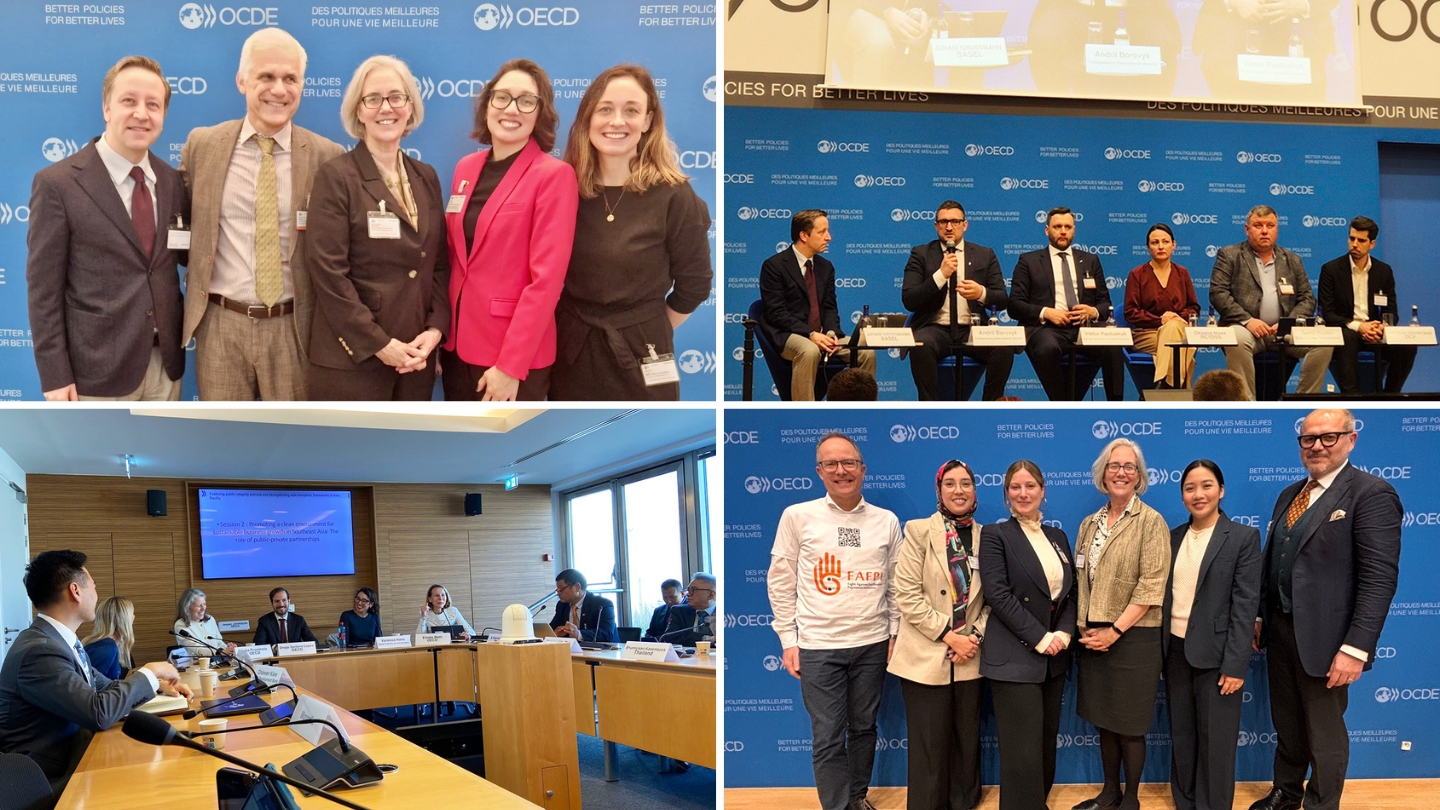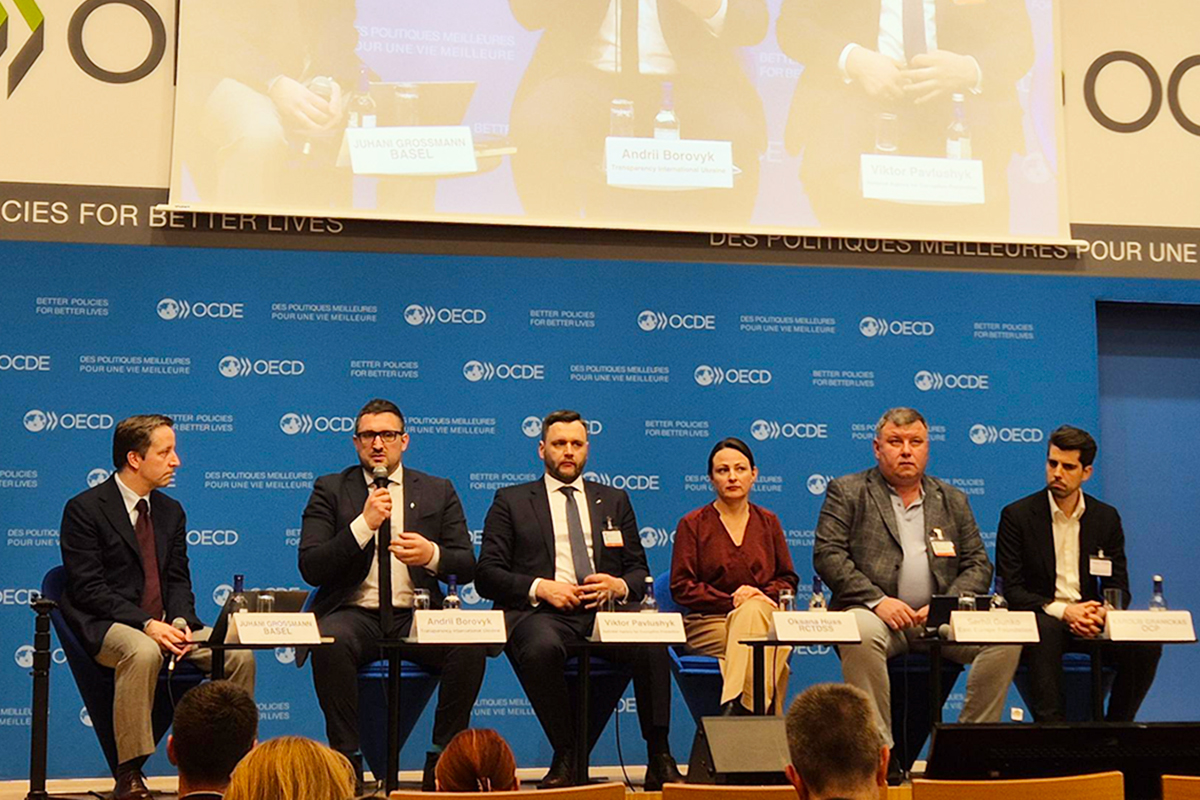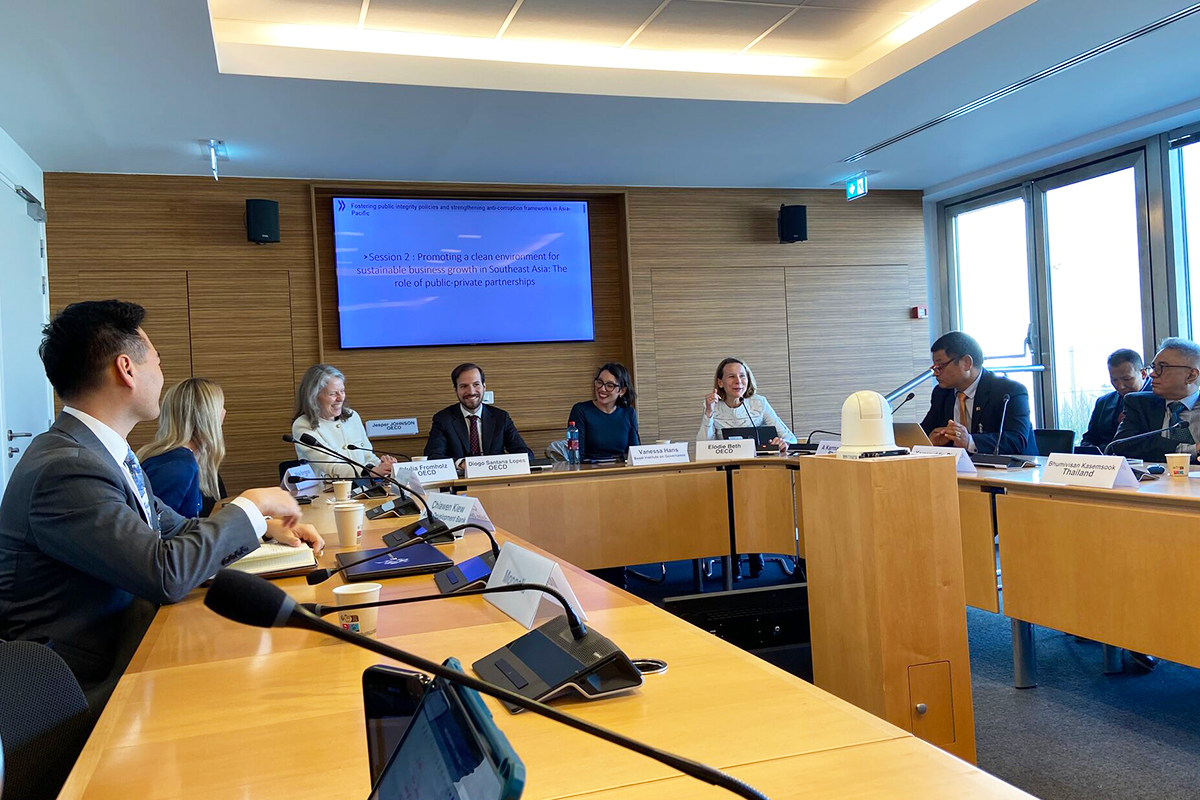Staying the course: business integrity in a fragmented political climate

“Strong and productive partnerships across diverse sectors were everywhere in evidence at the OECD Global Anti-Corruption & Integrity Forum. Such solidarity and collaboration are critically important, particularly in the face of the headwinds confronting the anti-corruption movement today."
– Elizabeth Andersen, Executive Director, Basel Institute on Governance
This blog by Lucie Binder, Senior Specialist, Governance and Integrity, reflects on the 2025 OECD Global Anti-Corruption & Integrity Forum and the challenges and opportunities facing all who are committed to promoting high standards of ethics and integrity.
Among the many thoughtful discussions at this year’s Global Anti-Corruption & Integrity Forum, one quieter note resonated: the reduced presence of civil society organisations.
These groups – traditionally at the forefront of driving transparency and accountability – were fewer than in previous years. In part this was due to mounting funding pressures, especially those linked to recent changes in United States foreign assistance policy.
While their absence was not the main story, it was a reminder of the broader reality: those working to uphold integrity are operating in a more constrained global landscape.
Yet the tone of the Forum was far from defeatist. In fact, one of its most striking insights was that constraints can drive clarity and innovation. Nowhere was this more powerfully illustrated than in the sessions on Ukraine.
Amid the pressures of wartime, Ukraine’s business integrity and anti-corruption efforts have not been put on hold – they have become more focused. Faced with existential challenges, the priorities are clear: uphold transparency in decision-making, ensure the ethical use of public and private resources, and reinforce the integrity of institutions and businesses alike.

A chance to make integrity work better for all
This clarity of mission offers a valuable lesson for others. Even in times of political uncertainty and institutional fragility, there are opportunities to innovate and strengthen business integrity – not simply to maintain compliance, but to leverage it as something core to an organisation’s purpose, resilience and long-term value.
Rather than treating compliance as an afterthought or a legal checkbox, companies can design operations, decision-making processes and incentive structures that align with ethics and integrity from the outset, helping to build long-term trust with stakeholders, and reduce risk by creating more stable operating environments.
Emerging technologies offer tools to identify risks earlier and act proactively, even in contexts where external oversight is weak or politicised. (Here again, our Ukrainian colleagues shared inspirational approaches.) Such tools can help business decisions to be both commercially sound and ethically grounded, independent of shifting regulations and political priorities.
Cooperation for fair competition
Across industries, there is renewed incentive to build shared standards and mutual accountability. Collective Action can establish a level playing field and protect against the risks of regulatory backsliding.
Our Knowledge Partner session on anti-corruption Collective Action and sustainable development revealed that companies do appreciate tangible benefits from participating in Collective Action initiatives, such as integrity certification or visibility from participation. But what they are ultimately seeking is a reduction in corruption, both nationally and globally. That leads to fairer, more predictable market conditions, especially across complex supply chains. Our new working paper presenting a typology of Collective Action initiatives provides a roadmap for companies to work together toward such meaningful change.
![GACIF Knowledge Partner session: Anti-corruption Collective Action as an enabler for sustainable development]](/sites/default/files/2025-04/KP%20session%20Collective%20Action.jpg)
Showing leadership, scaling solutions
At the national level, particularly in countries where democratic institutions are under strain, companies and public actors alike have the opportunity to lead by example. Even when enforcement is inconsistent, adherence to recognised standards can demonstrate a clear commitment to integrity and build public trust.
These themes were explored in depth during the Asia-Pacific regional session on disclosures for public integrity. The session highlighted how reporting tools and digital mechanisms can be leveraged to promote transparency, accountability and the development of effective public integrity policies. The role of emerging technologies in this space – from data platforms to digital dashboards – is becoming increasingly central to how national systems build resilience and respond to integrity risks.
We also had the opportunity to moderate a session on the role of public-private partnerships in promoting a clean environment for sustainable business growth in Southeast Asia, where the panel discussed how a clean business environment can be a catalyst for sustainable development across the region. The conversation built on previous Collective Action initiatives and emphasised the value of cross-sector collaboration, while underscoring the role of innovation and technology in enabling effective, scalable solutions to integrity challenges.

Fighting corruption means challenging threats to anti-corruption
What emerged most clearly from this year’s Forum is that this is a time to focus, consolidate, leverage partnerships, and act with purpose. The challenges are real — shrinking resources, political pushback, and unstable governance environments. But they also underscore why integrity must remain at the centre of sustainable development.
Without accountability and ethical governance, efforts to advance economic, environmental and social goals risk being undermined by mismanagement and corruption. Integrity provides the foundation for fair institutions, efficient use of resources and inclusive growth — all of which are vital for development that is truly sustainable and resilient.
In this context, innovation is not only possible but essential. It enables new tools, partnerships and approaches to uphold integrity where traditional mechanisms may be under strain.
And we must also remember that the broader international framework for integrity remains largely intact:
- Transnational regulation and enforcement continues to apply pressure on corporate misconduct.
- Multilateral organisations, including the OECD, continue to provide stable platforms for cooperation and standard-setting.
- Global companies continue to invest in business integrity.
Whether through international frameworks or local initiatives, standing up for integrity remains one of the clearest pathways to restoring public trust and strengthening the foundations for long-term peace and prosperity.
Learn more
- OECD 2025 Global Anti-Corruption & Integrity Forum
- See the Basel Institute's Quick Guide to business integrity and ethics
- Learn more about anti-corruption Collective Action




